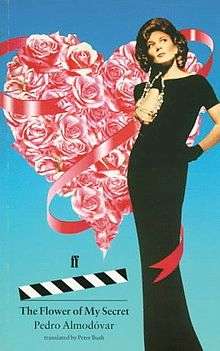The Flower of My Secret
| The Flower of My Secret | |
|---|---|
 | |
| Directed by | Pedro Almodóvar |
| Produced by |
Agustín Almodóvar Esther García |
| Written by | Pedro Almodóvar |
| Starring |
Marisa Paredes Juan Echanove Carme Elías Rossy de Palma Chus Lampreave |
| Music by | Alberto Iglesias |
| Cinematography | Affonso Beato |
| Edited by | José Salcedo |
Release dates |
|
Running time | 102 minutes |
| Language | Spanish |
| Box office | $1 million |
The Flower of My Secret (Spanish: La flor de mi secreto) is a 1995 by Spanish director Pedro Almodóvar. The film was selected as the Spanish entry for the Best Foreign Language Film at the 68th Academy Awards, but was not accepted as a nominee.[1][2]
Plot
Marisa Paredes is Leocadia ("Leo") Macias, a woman writing popular romance novels under the pen name Amanda Gris. Unlike her romantic ("pink") novels, her own love life is troubled. Leo has a difficult relationship with her husband Paco (Imanol Arias), a military officer stationed in Brussels and later in Bosnia, who is distant both physically and emotionally. The film starts with Leo writing about the feeling of having lost her lover, a feeling that she compares to the pain of a tight pair of boots that she can't take off. Almodovar took for this first part of the film strong plot elements from Dorothy Parker's short story The Lovely Leave[3]
Leo begins to change the direction of her writing, wanting to focus more on darker themes such as pain and loss, and can no longer write her Amanda Gris novels. However, her publishers demand sentimental happy endings, at least until her contract is up. She begins to re-evaluate her life through her relationship with her publishers, her husband, her best friend Betty (Carme Elías), her "crab-faced" sister Rosa (Rossy de Palma) and her bickering elderly mother (Chus Lampreave). Only her maid (played by flamenco dancer Manuela Vargas) appears steadfast. She also meets Ángel (Juan Echanove), a newspaper editor who quickly falls for Leo and her writing.
After having signed a contract with the newspaper El País, Leo tells Ángel that she can't write romances anymore, and that she has written a dark ("black") novel about a young mother whose daughter kills her husband because he tried to rape her. After that, the corpse of the dead man is hidden in a refrigerator. Although Leo throws this story out, she later learns that someone is turning it into a movie. (In fact, Almodóvar himself created a movie based on this same plot, "Volver", released eleven years later in 2006.)
After the inevitable disintegration of her marriage and then learning that her best friend was her husband's lover, Leo takes and survives an overdose, then goes with her mother to the village of Almagro to rest and recover. There she receives a call from her publishers, who are apparently delighted by the two manuscripts they have received from her — romances Leo never wrote or submitted. She returns to Madrid and learns that Ángel is her ghostwriter. More surprises unfold when she attends a brilliant dance performance featuring her maid, Manuela Vargas, and Joaquín Cortés, who plays the maid's son, Antonio. Antonio soon confesses that he is the one who took her manuscript now being made into a movie. A final surprise for Leo: after a false start, she finds love with the smitten Ángel, and the film ends with the tenuous promise of a "new year".
Cast
- Marisa Paredes- Leo Macías
- Juan Echanove - Ángel
- Carme Elías - Betty
- Rossy de Palma - Rosa
- Chus Lampreave - Madre de Leo
- Kiti Manver - Manuela
- Joaquín Cortés - Antonio
- Manuela Vargas - Blanca
- Imanol Arias - Paco
- Gloria Muñoz - Alicia
References forward to other Almodóvar films
In The Flower of my Secret, the plot of Leo's new, gritty, novel is stolen and used as the basis of a film screenplay The Freezer. In a coup of life imitating art, a decade later it formed the basis of Almodóvar's own 2006 film Volver.
Another sub-plot scene from The Flower of my Secret, the student doctors being taught how to persuade a grieving mother to allow her son's organs to be used in transplant, was used as the starting point of Almodóvar's 1999 film All About My Mother.
Awards
- 1996 — 7 Goya Award nominations
- Marisa Paredes won Best Actress at the Karlovy Vary International Film Festival, the ACE Awards and the Sant Jordi Awards
See also
- List of submissions to the 68th Academy Awards for Best Foreign Language Film
- List of Spanish submissions for the Academy Award for Best Foreign Language Film
References
- ↑ Margaret Herrick Library, Academy of Motion Picture Arts and Sciences
- ↑ "41 to Compete for Foreign Language Oscar Nominations". FilmFestivals.com. Retrieved 4 October 2015.
- ↑ "Pedro Almodovar, Tempted by Austerity". latimes.com. 1996-03-26. Retrieved 2015-08-06.
External links
- La flor de mi secreto at the Internet Movie Database
- The Flower of My Secret at Rotten Tomatoes
- The Flower of My Secret at Metacritic
- The Flower of My Secret at Box Office Mojo
- Interview with Pedro Almodóvar about The Flower of My Secret
- LA Times article on The Flower of My secret
| ||||||